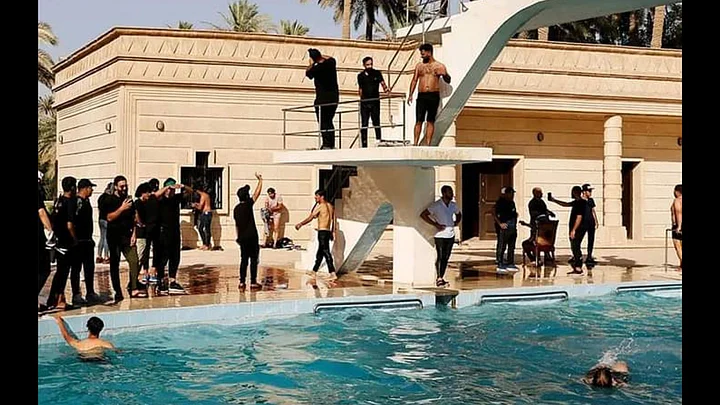Violent protests broke out in Iraq's capital Baghdad after Iraq's influential Shi'ite cleric Muqtada al-Sadr announced that he was quitting politics on Monday, 29 August. At least 10 protesters have reportedly died in the protests so far, according to Reuters and Associated Press.
Akin to the Sri Lanka crisis, protesters in Baghdad stormed the Republican Palace.
Photos and videos surfaced online, which showed protesters swimming in the pool, bearing an uncanny resemblance to when demonstrators took over former President Gotabaya Rajapaksa's palace in Sri Lanka.
Iraq Political Crisis
Iraq is currently facing a political crisis since al-Sadr's party secured the largest majority in the October parliamentary elections, but did not get enough seats to form a government. The country's different political factions failed to form a new government due to ideological differences. After the poll results, al-Sadr refused to form a coalition with his rivals.
Al-Sadr's party is staunchly opposed to Iranian influence in Iraq's domestic politics. The Coordination Framework, an all-Shiite organisation, formally made Mohammad al-Sudani the Prime Minister on 25 July.
Al-Sadr's supporters broke into the parliament in July, to stop his rivals in the Coordination Framework from forming a government. Hundreds of people have been staging a sit-in outside the parliament for over a month now.
Al-Sadr and his followers have opposed al-Sudani's nomination as he belongs to the Islamic Dawa Party, which supported the Iranian revolution and Iran during the Iran-Iraq war.
The party continues to receive funding from Iran. Al-Sadr's supporters broke into a protest over his nomination in July, as he is considered to be too close to Iran.
Protests In Baghdad
Followers of al-Sadr protested in Baghdad hours after the news of the leader stepping down from politics came to light on Monday, 29 August. Saraya Salam, a militia linked with al-Sadr, clashed with the Popular Mobilisation Forces security group.
At least 10 protesters were killed, according to Reuters and Associated Press, and many more were injured by tear gas and physical altercations with the riot police.
Al-Sadr's announcement about quitting politics came after months of protests by his followers backing his call for the dissolution of the Iraqi parliament and for fresh elections.
Additional reinforcements were sent to the presidential place as hundreds of followers of al-Sadr pulled down the cement barriers outside the building and forcefully entered the palace, which is a key meeting place for Iraqi heads of state.
The Iraqi army lifted the curfew after Sadr called for an end to the protests, reported AFP news agency.
As per Russia Today, al-Sadr's decision to exit politics reportedly came as a reaction to the retirement of Shia leader Ayatollah Kadhim al-Haeri, who stepped down for health reasons and called for his followers to give their allegiance to Iran's Ayatollah Ali Khamenei.
Sri Lanka Political Crisis
On 9 July, thousands of protesters breached police barriers and stormed into the residence of then Sri Lanka President Gotabaya Rajapaksa in Colombo in a protest against the economic crisis in the country.
Protesters had live-streamed the storming of his residence on Facebook. Videos showed people shouting slogans against Rajapaksa as they stormed the residence. At least 21 people were injured and hospitalised.
Photos and videos of protesters swimming in Rajapaksa's swimming pool and enjoying the luxuries in his house had made the rounds on social media.
Rajapaksa had fled from his residence amid protests and was forced to resign due to the upheaval caused in the country.
(At The Quint, we question everything. Play an active role in shaping our journalism by becoming a member today.)
